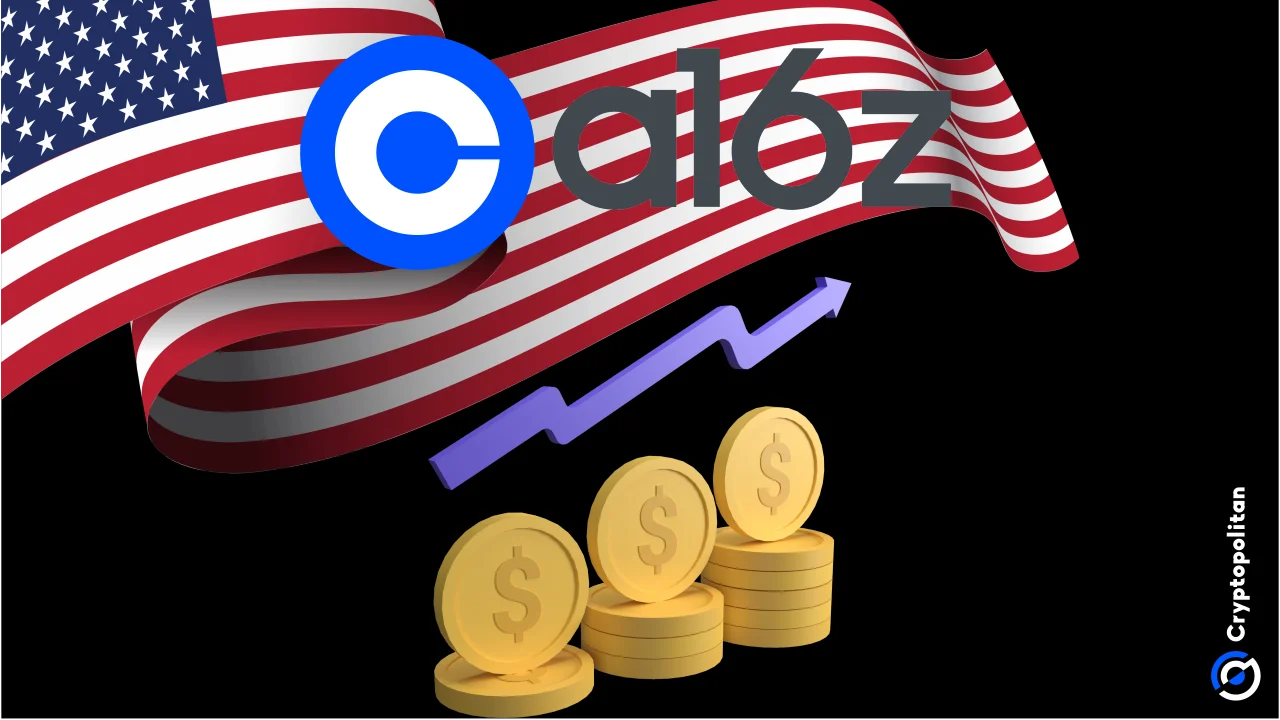Crypto giants Coinbase and Andreessen Horowitz (a16z) have invested heavily in Fairshake, a pro-crypto and bipartisan super PAC gearing up for the 2026 U.S. midterms.
Fairshake announced it has already raised $78 million, just one day before the U.S. general election. These contributions, which split into $30 million already collected and an additional $48 million in new pledges, come from some of the biggest names in the crypto sector, including centralized exchange Coinbase and venture capital powerhouse Andreessen Horowitz.
The breakdown shows that a16z poured $23 million more into Fairshake, with Coinbase following up by adding $25 million to the PAC’s 2026 cycle funding. Chris Dixon, a16z general partner overseeing the firm’s crypto operations, laid out the strategy in a recent letter.
Dixon’s message was clear: they are backing politicians committed to solid regulatory frameworks that encourage industry growth and consumer safety. “Regardless of what happens in the 2024 elections, we’re committed to supporting policymakers, irrespective of party affiliation, who will work to establish a practical regulatory framework that protects consumers while allowing the industry to grow,” Dixon wrote.
Major crypto players pump PAC with millions
Andreessen Horowitz has taken a leading role here, having already contributed a total of $70 million to Fairshake. This heavy funding aligns with a16z’s ambition to build a Congress full of legislators favorable to crypto.
As Dixon stated, supporting Fairshake is only “one crucial part of the strategy” they’re implementing to advance their policy goals. To reinforce their position, a16z plans to keep lobbying both Democrats and Republicans who support crypto regulations that promote innovation and industry stability.
Coinbase, the U.S.’s largest crypto exchange, has given Fairshake over $75 million in total across various cycles and remains one of the PAC’s biggest contributors. Coinbase’s interest here is clear; they need supportive legislation after facing a lawsuit from the U.S. Securities and Exchange Commission (SEC) for allegedly conducting unregistered securities sales.
Coinbase CEO Brian Armstrong didn’t hold back on the need for favorable policies. “We know we need to have pro-crypto legislation passed in this country,” he declared during Coinbase’s third-quarter earnings call. Notably, Coinbase’s share price dropped 15% after its earnings report revealed misses on both top and bottom lines.
Joining the PAC’s funding powerhouse, Ripple Labs, another significant crypto player, has contributed around $50 million so far, with $25 million allocated both this year and last. A Ripple spokesperson confirmed that the company aims to remain a central player in Washington for years to come.
Altogether, Fairshake claims it has raised around $170 million and disbursed approximately $135 million, making it one of the highest-spending PACs in the 2024 cycle, even outmatching sectors like oil and banking.
Political gains and pro-crypto agenda push
Nearly half of all corporate money pouring into the 2026 election cycle is coming straight from the crypto industry, reports the watchdog group Public Citizen. In fact, Fairshake’s influence appears significant; out of 42 primary races backed by crypto-related PACs, 36 resulted in victories for candidates supported by crypto interests.
That level of success is the kind of political leverage these firms are seeking, as they push for comprehensive legislation on digital assets and stablecoins pegged to real-world assets like the U.S. dollar. Fairshake’s backers include a range of companies and wealthy individual donors like Armstrong, who contributed $1 million personally, and the Winklevoss twins, who added $5 million.
With powerful backers like these, Fairshake’s founders—originally a consortium of crypto firms—have made this PAC one of the biggest players on Capitol Hill. Their donations fuel targeted spending in both House and Senate races, reflecting an aggressive effort to secure a legislative environment that favors crypto.
Chris Dixon highlighted how Fairshake is different from other industries’ lobbying approaches. “Many industries come to DC asking to roll back rules, and we have come to DC asking to establish them,” Dixon explained in his post Monday. This strategy marks a shift from crypto’s earlier “hands-off” stance toward regulation, signaling a new phase where crypto firms actively seek structured oversight.
Wall Street and crypto braced for election impact
As the 2024 U.S. general election unfolds, Wall Street’s biggest trading desks are also bracing for the potential shifts a coin-toss election might bring. Trading teams at giants like JPMorgan Chase & Co. and Goldman Sachs Group Inc. have arranged for overnight staffing to handle the surge in volatility expected as results roll in.
Both Hong Kong and Singapore teams will assist with the overnight work, tracking trades and adjusting to swings in markets as investors weigh the impact of a potentially crypto-friendly administration. Markets are already showing movement as election odds lean toward different outcomes.
Following a poll giving Kamala Harris a lead over Donald Trump in Iowa, the Dollar Spot Index fell sharply Monday morning, recording its biggest slide since August. Bond yields on 10-year Treasuries also fell, while the Mexican peso rose, responding to Trump’s tariff rhetoric. Bitcoin, which has enjoyed a boost under Trump’s pro-crypto stance, saw a slight dip, reflecting market jitters tied to changing expectations.
Equity options volatility has been climbing, indicating that investors are hedging against post-election market swings. Trading desks across the industry are preparing for potential all-nighters, monitoring the impact of either a Harris or Trump victory.
The implications for crypto, too, are massive. If Harris wins, crypto traders expect a quick reversal of popular “Trump trades,” potentially triggering intense overnight activity. And, as Biden’s 2020 win showed, trading volume can hit record highs when the results finally settle.
The stakes aren’t lost on U.S. hedge fund managers, some of whom are going all out to stay informed on the ground. Marko Papic, chief geopolitical strategist at BCA Research, noted that while his main focus is stock and bond trades, his clients are asking if he foresees any civil unrest post-election.
It’s a sign of how the 2024 cycle has polarized even Wall Street, with both retail banks and major investment firms preparing for any fallout. At some of the biggest banks, like RBC BlueBay Asset Management, CIO Mark Dowding has already pegged the odds of a Trump win at 70% after talking to optimistic Republicans and concerned Democrats in the U.S.
Retail banks with extensive branch networks are preparing contingency plans, especially in swing states where protests could disrupt normal operations. Banks have hinted at the possibility of closing branches or shifting employees to remote work if the results delay or spark protests.





